Jul 2020
Newborn seal pup taken to rehab
Jul/25/20 01:04 PM
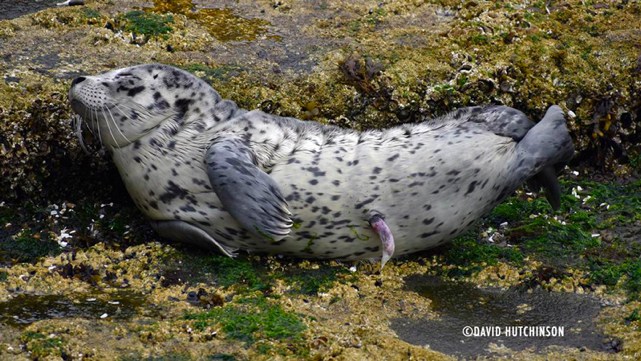
First Responder Jay immediately headed to the site, armed with stranding materials if necessary to keep people back. Upon arrival, he saw a short stub of umbilical cord on the alert pup’s belly. He notified other responders that we had a newborn seal on our urban beach - a scenario that often has a bad outcome. Abandonment is much more likely when people or dogs cause disturbance and frighten a mom away. If a mom has not bonded with her newborn or fears for her own safety, she may not return to nurse the pup, who cannot survive without her.
For the past 5 months, NOAA’s Marine Mammal Stranding Networks have been trying to determine how to respond to and protect animals while abiding with safety considerations and distancing mandates in these COVID times. Seal Sitters’ response area has miles of urban shoreline, almost all accessible to the public for recreation purposes. During this difficult time, our responders have been deliberating the logistics of giving seal pups the protection and rest they need, yet keeping our volunteers and the public safe - all the while trying to keep people at a distance, not only from the pup, but also from each other and discourage assembly. A heady challenge.
That challenge was put to the test Wednesday morning. A quick perimeter of yellow tape emblazoned with “Share the Shore” was established on the sidewalk above the pup and cones were placed on the beach. Fearing that the pup might already have been abandoned, a call was placed to PAWS Wildlife Center to see if they had an open space to accept the pup if necessary. The answer was yes. A second call was made to SR3, a valued non-profit which provides support to the stranding networks. Arrangements were made for their vet to do an on-site visual evaluation of the tiny seal. Based on the length and color of the umbilical cord, the pup was likely only a day old.
Since the seal was alert and assessed to be in relatively good body condition, the decision was made to maintain a low-key volunteer presence to ensure her safety onshore, in hopes the mom might return sometime during the day - or, more likely, in the evening when human activity had quieted down. A pup’s best chance for survival is always with mom. While rehab can fatten up a pup in a small pool, robust enough to be released back into the wild, it cannot teach a pup life skills and how to hunt in the vast waters of Puget Sound. The plan was to capture the pup for transport if the pup’s health declined during the day or if she was still onshore the next morning.
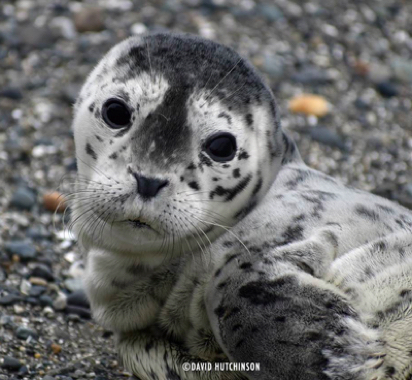
At 5pm, with an ever-encroaching return tide, Echo was forced into the cold waters of Puget Sound. She paddled along the edge the sea wall, trying several times to haul out again, but finally gave up and swam straight out, away from the beach.
Later, she came ashore right in front of the Alki Bathhouse. Resting only briefly after having struggled in the surf, the incoming waves swept over her once more and the exhausted pup again took off. Volunteers scanned the waves, but here was no sign of an adult seal waiting anywhere offshore.
Shortly after 8pm, the hotline received a frantic report that people were throwing rocks at a pup at the end of the public promenade. Seal Sitters arrived within minutes and Echo was already swimming west toward private beach, inaccessible to responders because of the high tide. We guessed that she likely ended up in a particular nook just on the other side of a cement bulkhead. We were optimistic that little Echo might find some peace and rest there for the night, but less optimistic that mom was still around to feed her.
Sure enough, early the next morning the homeowner phoned Seal Sitters Hotline (206-905-SEAL) to say that Echo was on his beach. Based on deteriorating body condition, indicative of the absence of an attending mom, the decision was made to take her to rehab. Echo was captured and transported by SR3 to PAWS rehabilitation facility in Lynnwood.
PAWS reports that the female pup weighs almost 20 pounds and is just under 30 inches long. At intake, Echo was thin and dehydrated, but the hope is that she will do well in rehab. Seal Sitters thanks PAWS for giving this stunning silver pup a chance for survival. A heartfelt thanks goes out to SR3 for their field support and to Seal Sitters’ First Responders and volunteers who protected Echo throughout a long, stressful day.
Seal pupping season underway in Washington
Jul/10/20 09:31 AM
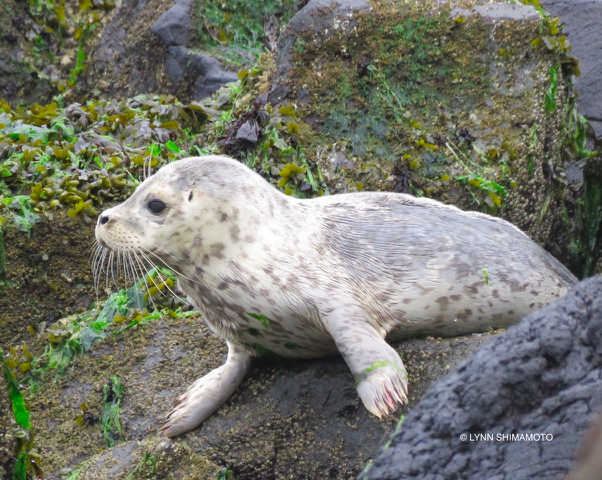
Rotund pregnant females can be seen hauled out on sandbars and rocky outcroppings, waiting to give birth. Seal moms with nursing newborns, along with pups that are newly weaned and independent, are resting on shore, log booms, private docks and marinas. For a map showing pupping seasons in the various regions of Washington state, click here.
DO NOT FEED, TOUCH OR MOVE SEAL PUPS - ALWAYS STAY BACK
Please be alert if you are strolling along ocean and Puget Sound beaches. On outer coast beaches that permit driving of motorized vehicles, be extra cautious - a tiny seal pup can look like a piece of bleached driftwood, easily run over and killed. If you come across a pup, please stay back and observe quietly from a distance. Contact the local stranding network.
It is normal for a seal pup to be alone on the beach - always keep dogs leashed and away. Stay back. Occasionally a mother harbor seal will leave her pup resting alone, returning to nurse. Or, if a pup was born on a dock or raft, often the pup cannot get back up onto the structure with mom and will end up on shore nearby. If there are people and dogs too close, she may abandon the pup. Most times, however, the pup will accompany mom to learn how to forage.
Once pups are weaned at 4-6 weeks, they will be all on their own, using shoreline daily to rest and warm up before returning to the water. Weaned seal pups need space to rest undisturbed as well. A pup that is scared into the water wastes precious calories - and this can truly be the difference between life and death. Seals of all ages rest on shore about 50% of their day. Undisturbed, stress-free rest is crucial to their survival. Visit Seal Sitters’ website to learn more about harbor seals.
STAY FAR AWAY FROM SEAL HAUL-OUTS TO PREVENT PUP ABANDONMENT
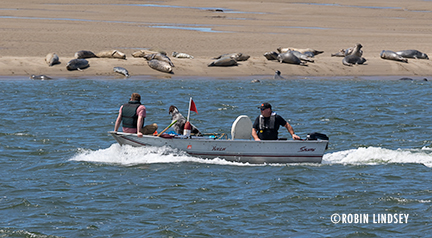
This is a reminder that when you venture out to the beach that marine mammals are protected by Federal Law. Always respect animals’ space and need for quiet. Stay back!
SUMMER AND FALL IS PRIME PUP TIME IN SOUTH PUGET SOUND
In South Puget Sound, seal pupping season usually begins in late-June and extends into the first week of September. As pups are weaned in area rookeries, they venture off to surrounding areas. West Seattle’s busiest months for newly weaned seal pups are September and October, but over the past few years, more lanugo (premature) and newborn pups have been seen here in June. These newborn pups in urban areas, like West Seattle lanugo pup Luigi (below) are highly likely to be abandoned because of human activity and off-leash dogs.
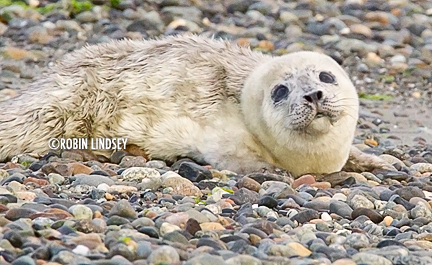
Please contact the stranding network to respond to a lanugo pup.
WHO TO CALL
If you see a pup alone onshore, stay back and notify your local Marine Mammal Stranding Network. In West Seattle, call Seal Sitters hotline @ 206-905-SEAL (9325). For other beaches, call the NOAA Stranding Hotline @ 1-866-767-6114 (or consult map link below for local networks info).
To find direct info on the network for your area, click the links for a map of stranding networks in the Pacific Northwest: Washington map | Puget Sound map | Oregon map
SEALS ARE PROTECTED BY LAW FROM HARASSMENT - RESPECT NATURE AND STAY BACK
Leave seal pups be - don’t touch, move or feed them. Please stay a minimum of 100 yards away from resting seals. Like all marine mammals, they are protected from harassment by the Marine Mammal Protection Act and Washington State law RCW 77.15.130 (a criminal misdemeanor, mandatory court appearance, punishable with up to 90 days in jail and up to $1000 fine).
Harassment or harm can be reported by calling NOAA Office for Law Enforcement’s hotline at 1-800-853-1964 (information may be left anonymously, but details are critical for enforcement purposes).
Boaters, stay back from newborn seals
Jul/10/20 08:33 AM
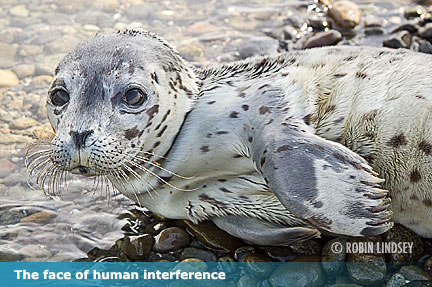
Harbor seal haulouts are full of pregnant females and newborn pups in Puget Sound and pups can be found all along the Washington coastline and inland waterways. Harbor seals also use jetties, breakwaters and log booms for haulouts.
Please stay a minimum of 100 yards away from resting seals. Like all marine mammals, they are protected from harassment by the Marine Mammal Protection Act and Washington State law RCW 77.15.130 (a criminal misdemeanor, mandatory court appearance, punishable with up to 90 days in jail and up to $1000 fine).
Pups pay a terrible price for human disturbance. The pup shown above was found in 2012, starving on Cutts Island, along with two other emaciated pups and several dead ones. All had been abandoned by their mothers because boaters disrupted the seal colony on this small island near Gig Harbor. A day of boating fun for people can be a death sentence for seal pups. During boating season, thousands of boats can be moored offshore at Cutts disrupting this historic harbor seal haulout (called a “rookery” during pupping season).
If you find a spot for your picnic on a beach near a harbor seal, please move your picnic to another beach. There are reports of people with blankets and coolers surrounding a lone seal pup - finally calling the stranding network wondering why the mother did not return. A harbor seal mom, shy and wary of humans, will abandon her pup if people and dogs are around! Use common sense and help protect wildlife from harassment.
If you are boating or kayaking, please stay far away from resting harbor seals. In 2010, we documented a speeding boat intentionally flushing seals from a protected island rookery with a sign posted “closed harbor”. In the photo below, you can see the boat scaring hundreds of seals from the beach, including pregnant females and many newborn pups. A female was giving birth right at that very moment and, terrified, she left her newborn pup, still in a bloody birth sac, alone on the deserted beach. The mom had no time to memorize the scent or call of her pup, which often leads to abandonment. Thankfully, a full 20 minutes after the boat left with the people onboard laughing, the mom returned to nurse her pup. More often than not, that pup would have been abandoned and slowly starved to death.
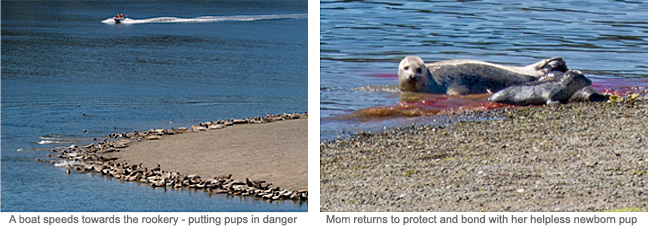
It is not a laughing matter to harass seals. It is a matter of life and death for seal pups. This incident was investigated by NOAA’s Office for Law Enforcement. Harassment is not just poking with sticks (yes, we have witnessed that) or scaring an animal back into the water - any change in an animal’s behavior caused by your presence is considered a “take” by law. This Federal law also prohibits touching, moving and feeding seal pups.
Many state parks on islands in the San Juans, Central and South Puget Sound have harbor seal rookeries. Do not approach animals by boat or by land. Please, be respectful and move your party elsewhere. If you see a violation, please call NOAA Office for Law Enforcement: 1-800-853-1964 and your local stranding network.
Boat launches and docks can have newborn or weaned pups sleeping on them or nearby, often in danger from propeller strikes or being run over by boat trailers. In some coastal areas, people are allowed to drive vehicles on the beach itself. On July 4th weekend in 2011, a pup was run over and killed on the beach at Ocean Shores - other animals, sick or weak and unable to move quickly, have been run over on beaches at Westport (California sea lion pup), Long Beach Peninsula (California sea lion), and Twin Harbors (adult harbor seal) at different times of the year. Please immediately report any pup (or adult) that is at a dangerous location or being harassed to your local stranding network.
Please be aware of your surroundings and give animals a break this summer. Respect that harbor seals need to rest and nurse. Recreate responsibly and you just might save the life of a seal pup. Fireworks are a moment’s thrill that can have heartbreaking consequences for wildlife.









